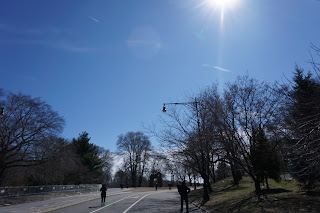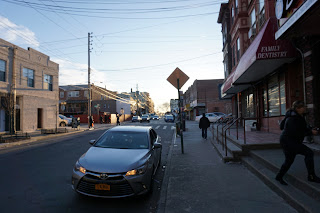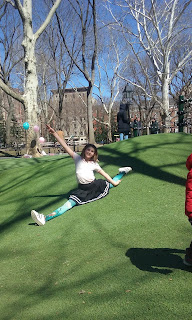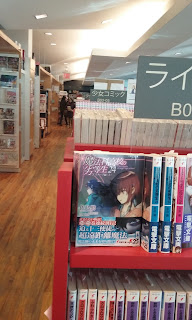Over the weekend, we whirled up to Beacan and Garrison, New York and back down to Brooklyn, where book clubs and conversations were everywhere. Some took place at the Commons, others at the baths in Brighton Beach. The weekend whirled, full of conversations about the state of the world, the delusions and nausea of the Trump years, the striking workers in West Virginia and the student walkouts of earlier in the week, the fall of the empire, literature, and social movements.
When we got back from Garrison, a group of us have been getting together at the Commons to read das Capital. We've debated the meanings of value and labor for weeks now, trying to make sense of the conflicting meanings and comments from the philosopher who started a social movement, whose texts cast long shadows. Like the Bible, we can find most anything we are looking for in this seminal text. The story of workers and the system in which they endeavor, the commodities they create with their labor is timeless and fascinating.
But none of it is simple. "The contradictory movement arises out of the twofold character of labor.," write Marx and Engels in Part One of Capital," The converse also holds," they conclude pointing to the contradictions which accompany this writing about people and movements, German philosophy, Hegel, and economics, each sentence seemingly pregnant with its opposite meaning. The system the writers are describing is in constant motion.
“Truth has only one face, that of violent contradiction,” –George Bataille
"A spectre is haunting Europe - the spectre of communism," they wrote in the Communist Manifesto.
A century later that spectre extends into a century of contractions, utopian dreams and horrors. The shadow extends in countless directions, including into the novels we read and the movements in which we take part, the movies about the Young Marx, the Death of Stalin, and Trosky in the theaters, the zeitgeist pushing us to remember and always to reassess.
Our 11 AM group has debated what is the right way to read Capital.
No one is really sure. So, we read Harvey. I think about Stanley Aronowitz who always cautioned about reading it with too much reverence.
I feel the shadow of Stalin's authoritarian thinking as we debate the right way to read the book.
Some people read it as an arbiter of truth; others move forward as if its a text, worthy of scrutiny. Its not the truth. Its one of many truths. Its not clear where value is found. Others worry that we can't walk away from truth into post modernism. That's what got us in this mess in the first place.
Gender dynamics take shape as men talk. Its the same pattern again and again, men talking a lot.
This shadow was on my mind as we discussed the Golden Notebook in my Activist Informed Reading group later in the afternoon. It was our second session reading the Golden Notebook.
"I was expecting a better ending," noted one of the members of our group. But this painful book about friendships and movements, sex and freedom, it was more than I could have imagined. And I found myself getting upset as I read, concerned, angry, sad about the compromises we all make.
Reading the stories of Anna and Molly and their exquisite honesty and painful conflict, eros and struggles with social movements, its hard not to feel like they are referring to our current moment.
"I wouldn't organize revolutions. Twenty years ago I would. But not now. Because now we know what happens to revolutionary groups - we'd be murdering each other inside of five years..." writes Lessing.
"I was going to read that part," noted Joannie. "Every movement I have been in has involved some level of fighting, weather its DAN, RTS or Times Up!" There is always racism and homophobia in movements, systems of oppression and efforts to challenge them.
Its never easy to be honest. But that is what the Golden Notebook is about, an honest inquiry into a world of sex and politics, hypocrisy and psychoanalysis. The authors reflect on their years in the communist party in England as they gradually learn about Stalin's purges and executions, realizing everything they fought for is connected with a taint of death and execution.
For the most part, relationships with men leave the women wanting or feeling used, as if their bodies were commodities.
But occasionally, there were connections, as Emily read about in one of her favorite passages.
“I was filled with such delicious intoxication
that I could have walked straight off into the air, climbing on the strength of
my own drunkenness into the stars. And
the intoxication, as I knew even then, was the recklessness of infinite
possibility, of danger, the secret ugly frightening pulse of war itself, of the
death that we all wanted for each other and ourselves."
Leslie brought over a copy of R DLaing's The Divided Self
An Existential Study in Sanity and Madness, reading from the second preface that seems very much appropriate for our day.
So we live our lives in this age of conflict and contradiction.
Emily read from a reflection on the fiftieth anniversary of the book in the Guardian, written by Margaret Drabble.
The Golden Notebook is a novel of shocking power and blistering honesty. I first read it about five years after its publication, when I was about 30, and it had an overwhelming impact. I remember vividly the state of excitement, terror and awe in which I read it, a semi-deranged state not unlike that of Lessing's narrator, Anna, in her north London flat. Here was a writer who said the unsayable, thought the unthinkable, and fearlessly put it down there, in all its raw emotional and intellectual chaos. She managed to make sense of her material, but at enormous risk. Luckily for me, I had already published three novels, and I had three children to keep me sane. Otherwise I might never have found my own voice. I might have gone off the rails completely.
Otherwise I might never have found my own voice. I might have gone off the rails completely.
Liberating indeed was all that discussion of menstruation and orgasm and frigidity. These subjects were about to hit the new women's magazines, but they hadn't yet quite made it, and we were enthralled by this direct confrontation with literary decorum. Anna's excessive fear of her own body odours is alarming, and one is not quite sure if it is intended to be neurotic, but at least it is named. James Joyce named defecation, and Lessing named menstruation. As for orgasm – well, we knew about that from Freud and the Kinsey Report as well as from real life, but we'd never seen it written about in this personal, descriptive, anecdotal, confessional, aggressive way. Again, Lessing's views are simultaneously progressive and conservative. She puts sexually conservative views into the mouth of Mother Sugar, the wise old Jungian analyst, but Anna seems to share them, and there is much inner debate about whether a woman can have an orgasm with a man she does not love, whether vaginal orgasm is superior to the clitoral orgasm (she decides it is), and whether a woman needs a "real man". I remember finding this concept of a "real man" very worrying at the time, and I still do. Anna, in her various manifestations, thinks most Englishmen are not real men. Those few that are real men are unfaithful and polygamous, but most men are unsatisfactory – rude to their wives, unable to give pleasure, bullying, selfish, indifferent to their children, eager to marry a younger secretary. Even the good-hearted ones come too quickly. No wonder Lessing's work was described as ball-breaking and "castrating", a word she often invokes. Experienced women had not written openly like this in the history of literature. It must have been terrifying. The pact of polite silence had been broken for ever.
The insistence on a lack of "real men" spills over into a homophobia more disturbing than the exposure of heterosexual male sexual vanity and insecurity. England is described as a country "full of men who are little boys and homosexuals and … half-homosexuals", and Americans don't fare much better. Anna's lodger Ivor and his partner Ronnie are "frightened men who measure out their emotions like weighed groceries". I noted this censoriously 40 years ago, when homophobia was more common than it is now, and it seems even more offensive today. Lessing has never been much interested in being fair or balanced. Anna/Lessing did note that Ivor and Ronnie's relationship was illegal, and there is a hint of speculation that that was why they behaved as they did. But she disapproved of them. She seems to have disapproved of lesbians, too, although brother-sister incest appears to be viewed as harmless. Lessing's moral spectrum is full of surprises and challenges, and that is one of the reasons why she is such an important writer. She takes little for granted.
I haven't left myself much space to praise Lessing's extraordinarily innovative experiment with the novel form, although this too deeply impressed me when I was young. It is not like anything else: it's in a different league from the other experimental novels of the 1960s in its grappling with narrative, identity, tone, truth. This is not experiment for its own sake, it is in no way modernist or ludic or post-modern, although one of the passages I know by heart is the one in which she writes: "Words. Words. I play with words, hoping that some combination, even a chance combination, will say what I want … The real experience can't be described … I think, bitterly, that a row of asterisks, like an old-fashioned novel, might be better."
Lessing is relentlessly truth-seeking, not ideologically experimental. Labels such as modernism meant nothing to her. When I was in China with her in 1993, we were introduced to our audiences by a Chinese professor whose specialist area of study was Joyce. He described himself as a scholar of modernism. "I don't call Joyce very modern," Doris muttered, as an aside. She made her own place. She didn't like categories. She didn't even recognise them."
We continued the conversation at the Russian baths later that evening.
The next day, number two and i made our way to Judson, where Micah reflected on the mysteries of our lives, our phobias and the ways we confront the unknown.
He started with a paragraph from Steven Hawking, who died this week.
“Remember to look up at the stars and not down at your feet. Try to make sense of what you see and wonder about what makes the universe exist. Be curious. And however difficult life may seem, there is always something you can do and succeed at. It matters that you do not give up...."
Outside the oddball church, a few words were illuminated on the old bulletin board as we walked out into the day:
"May you kiss
The wind when you turn from it.
Certain that it will love you back."
Lucille Clifton

 |
| a weekend in a life. |
















































































































































No comments:
Post a Comment